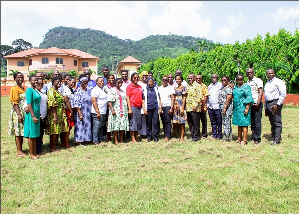 The framework provides essential guidance for adopting biosecurity standards
The framework provides essential guidance for adopting biosecurity standards
Stakeholders in the livestock and aquaculture sectors have emphasised the need for a collaborative approach to fully implement standards aimed at improving these two critical sectors of the economy.
At a recent workshop on biosecurity, they called for ongoing advocacy, capacity building, and policy alignment to strengthen biosecurity in the country's poultry, piggery, and aquaculture industries.
The workshop was organised by the African Women in Agribusiness (AWIA) and the African Women in Animal Resource Farming and Agribusiness Network (AWARFA-N) Ghana, in collaboration with the Sustainable Employment through Agribusiness (AgriBiz) program by Deutsche Gesellschaft für Internationale Zusammenarbeit (GIZ).
The initiative seeks to support the establishment of regulatory structures that will enhance biosecurity protocols and certify farms that meet these standards. This will contribute to improved food safety, environmental health, and economic growth within these key sectors.
Ghana shared the progress made thus far, including findings from extensive research, validation workshops, and stakeholder dialogue sessions. The workshop marked a significant milestone in the journey toward implementing the Biosecurity and Biocertification Framework.
This framework provides essential guidance for adopting biosecurity standards that protect animal health, ensure food safety, and promote environmentally sustainable practices across the industry.
The Biosecurity and Biocertification Framework was developed through an inclusive approach involving local communities, farmers' associations, government bodies, and international partners.
The workshop also served as a collaborative space for sharing insights, addressing challenges, and gathering valuable feedback.
Participants called for consistent funding through government budgets and donor contributions, as well as the strengthening of technical capacity among extension officers to support certification processes.
They also advocated for follow-up actions, including the establishment of a residue monitoring plan for aquaculture.
"Monitor and evaluate the implementation phases to adapt the framework as needed," they concluded.